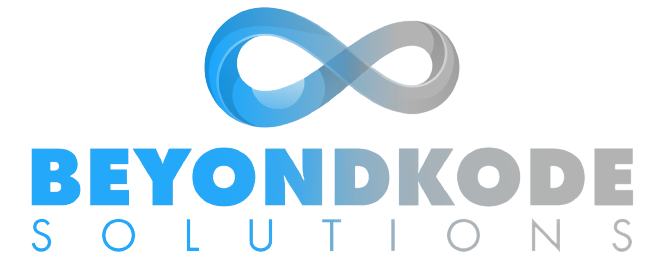- Executive Summary
- Technical Overview
- System Modules & Features
- Version Designer
- Web-based Dynamic Workflow
- Alerts and Notifications Manager
- Online Chat
- Business Intelligence Module
- Robotic Process Automation Module
- Open Connectivity Manager
- Hardware Integrations Agent
- User Security Protocols
- Single Sign-On
- Documents Archiving Technique
- Separation of Duties
- High Availability (HA)
- Add On’s
- Summary
An innovative digital experience platform that stands out from the rest. BeyondKode is equipped with a multitude of modules designed to simplify and expedite the automation of any business process, thereby reducing the time and effort traditionally associated with such tasks. BeyondKode is versatile and flexible, catering to both internal users (employees) and external users (customers and non-customers). It empowers companies to create and publish a variety of business processes tailored to their specific needs.
At its core, a business process in BeyondKode is comprised of:
- A data form (web page) for users to input, edit, view or delete data.
- Server-side low-code (in VB.NET or C#) for executing special process-related actions.
- CSS Style for customizing the user interface.
- JavaScript for facilitating actions on the client-side browser.
- Workflow management, allowing a process to be passed from one individual to another in accordance with a predetermined set of procedural rules.
To make it easy to build a process with less time and effort, BeyondKode Platform has the following features:
- Drag-and-Drop process designer and form builder.
- Drag-and-Drop workflow designer.
- Drag-and-Drop report designer.
- Drag-and-Drop query designer.
- Drag-and-Drop document designer.
- Drag-and-Drop IVR (Interactive Voice Response) designer.
- Custom user interface with CSS style.
- Multi-Lingual interface for any business process.
- Integration layer with 3rd party systems.
- SMS Queue to manage outgoing SMS messages.
- Email Queue to manage outgoing Email messages.
- Tasks tool to schedule tasks to be executed on a specific time.
Regarding users accounts, BeyondKode Platform supports the following:
- Local accounts.
- Active Directory accounts.
BeyondKode Platform is a multi-company multi-branch, where using the same application a user can login to different companies where he has access by typing : UserId@CompanyId or CompanyId\UserId in the login page of the system in addition to the account password.
BeyondKode Platform database could be SQL Server and/or Oracle with the ability to connect to more than one database by splitting system tables into different databases.
The feature of splitting system tables into different databases is useful when some tables have huge number of records (e.g.: Transactions and logs) so these tables could be moved to different database without affecting the performance and stability of the system. The following Figure shows the main architecture of the system database:
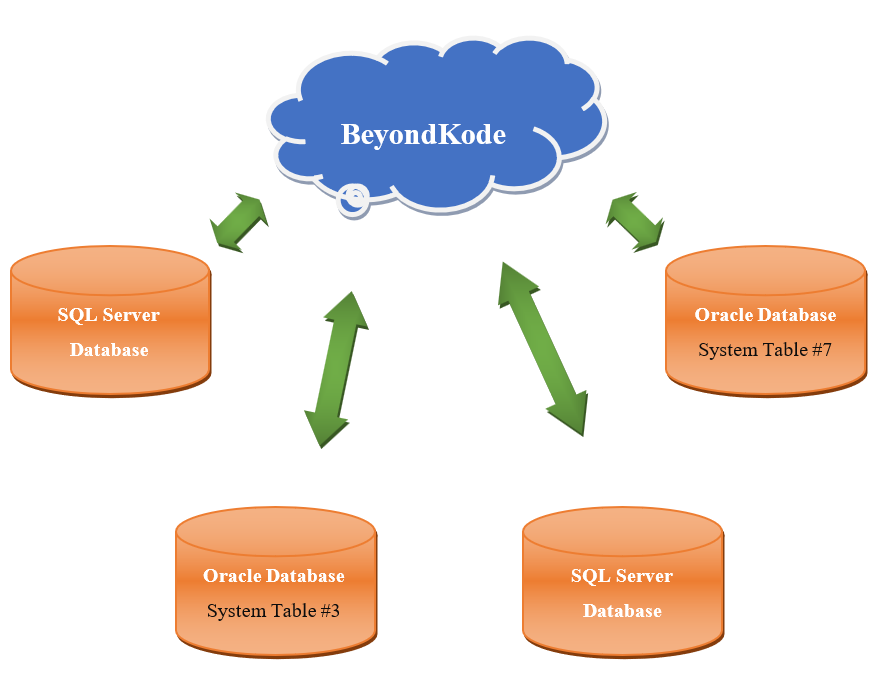
So BeyondKode Platform may have one database (SQL Server or Oracle) where all system tables found or may have more than one database and more than one database type based on the architecture agreed.
- In case of multi-company, each company’s tables may be in a different database, or in the same database but with a different schema.
- When login to a specific company, that company is isolated from other companies.
- System administrator may generate consolidated reports from all defined companies.
Based on the types of business processes built on top of BeyondKode Platform and how it was easy and fast to build them, we say that there is NO limitation of automating any type of business processes. Following are some types of automated business processes on top of BeyondKode Platform:
- Individual Customer Onboarding.
- Corporate Customer Onboarding.
- Loan origination.
- Credit Card Onboarding.
- Universal Teller Module.
- Post Dated Cheques management.
- Dashboarding and data analytics.
- Budgeting module.
Introduction #
BeyondKode Platform is a multi-tier platform consisting of many technology engines carefully nurtured and coherently connected to minimize coding efforts to accelerate business change. The unique technical capabilities of the multiple BeyondKode Platform engines enable automating business content of different levels of complexity.
BeyondKode Platform is API-enabled that makes organizations connect to multiple ecosystem players in their industry and across industries locally and cross border. Leveraging BeyondKode Platform sufficiently contributes to building cognitive enterprises: digitally enabled, smart processes over differentiated workflows, leanly automated and real-time business and technical performance monitoring amongst others.
BeyondKode Platform playdough nature as –a near-no-code platform- significantly improves the Software Delivery Performance. It reduces the development lead time, reduces mean time to restore, reduces change fail percentage and increases the development frequency and accordingly, continuous delivery becomes am organization capability rather than a far-fetch wish which is what distinguishes High Performers from others.
The Theatre #
The Theatre has its own Windows Management Services capability. This is a backend management service of the system that is applied to certain internal processes that need not be processed in the frontend web part of the software to boost the overall performance. Examples are many and include processes like executing complex workflows, generating different types of reports, importing files and downloading files from FTP/SFTP servers. BeyondKode Platform can be used to relatively rapidly develop industry agnostic cognitive business platforms and allows limitless continuous innovation
Mobility #
BeyondKode Platform can expose itself as a customer front end mobile and online portal utilizing its android based mobility module which is an integral part of the overall technology built. The relationship between BeyondKode Platform web-based backend and its clients front end is based on full synchronization from development to operations.
The BeyondKode Platform is a web-based, dynamic system, meticulously crafted with a variety of modules and features designed to cater to diverse business needs. Each module and feature plays a crucial role in streamlining processes, fostering efficiency, and enhancing user experiences. The comprehensive set of tools embedded within this platform encapsulates:
Version Designer #
BeyondKode Platform’s Version Designer module serves as an agile graphical user interface (GUI) builder. It allows users to construct screens and apply a variety of validation rules, including conditional and cross-field rules. Its flexibility extends to a multi-value feature that can be applied to system fields, supporting the input, amend, delete, and view actions either directly to the system database or via the system workflow.
As it enables the creation of multiple forms using the same data source or inputting data to the same source, it’s aptly referred to as the “Version” designer. Users can incorporate various controls in the built version form, including TextBox, CheckBox, TextArea, Dropdown List, DatePicker, FileBox, LocationBox, among others.
Key features of the Version Designer module include:
- Drag-and-Drop Feature: With the feature of drag-and-drop it’s easy and fast to create any form and process with only drag controls from the toolbox and drop on the working stage.
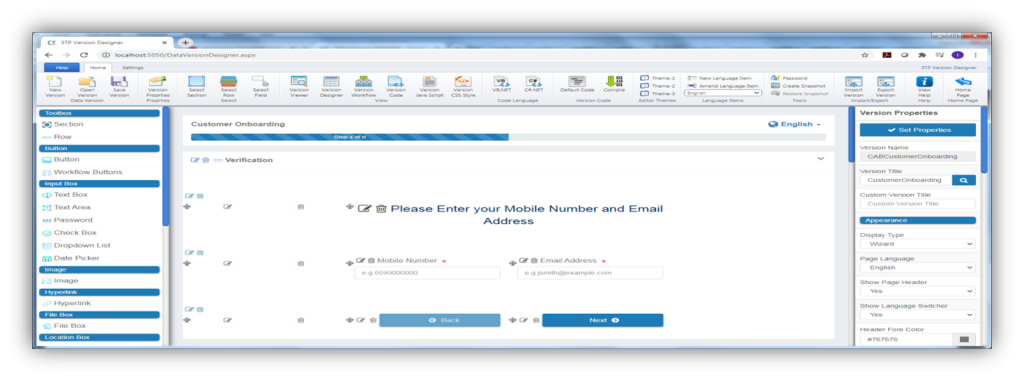
- Customizable User Interface: To customize user interface, custom style is easily applied on the form controls by writing CSS styles directly in the CSS window of the designer

- Client-Side Scripts Execution: A dedicated window is available for writing JavaScript that will be executed on the client’s browser.
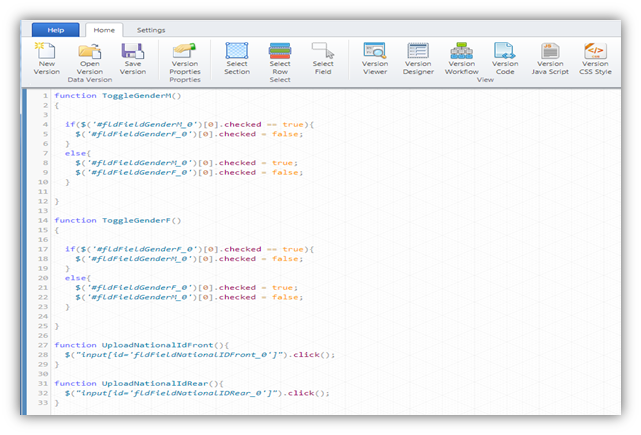
- Server-Side Code Execution: Developers have the option to write either VB.NET or C# code for specific processes for the back-end side, with the additional feature of code compilation. In addition, they can write CSS and JAVASCRIPT codes for the front-end.
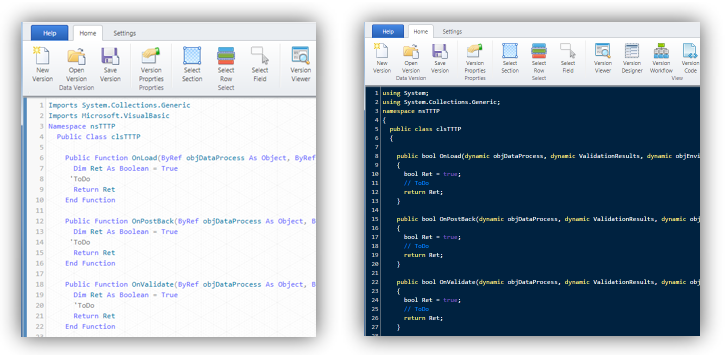
- Multi-Lingual Feature: All labels and texts in the form can be easily defined and assigned to controls, supporting a multi-lingual interface.
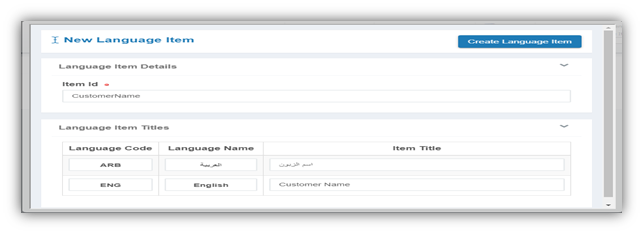
- Process Designer View: This gives users a direct view of how the form and process will appear to end-users, enhancing the development experience.
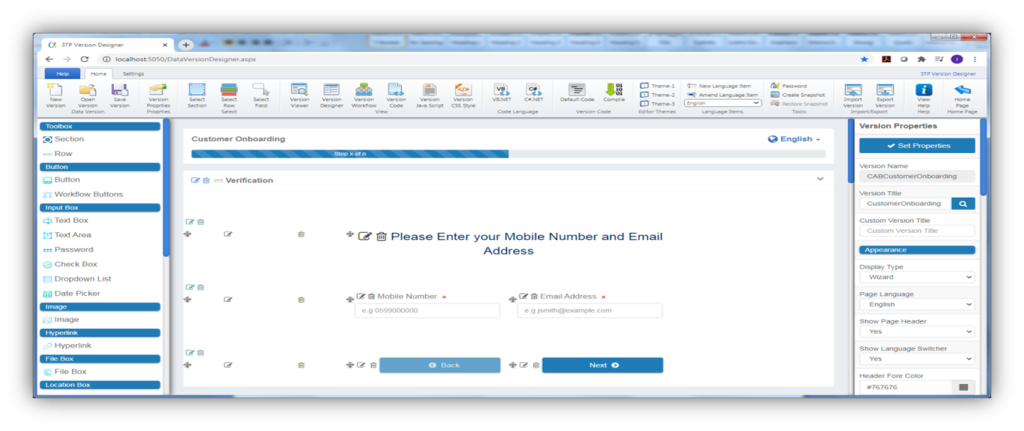
Device
View
PC /Laptop
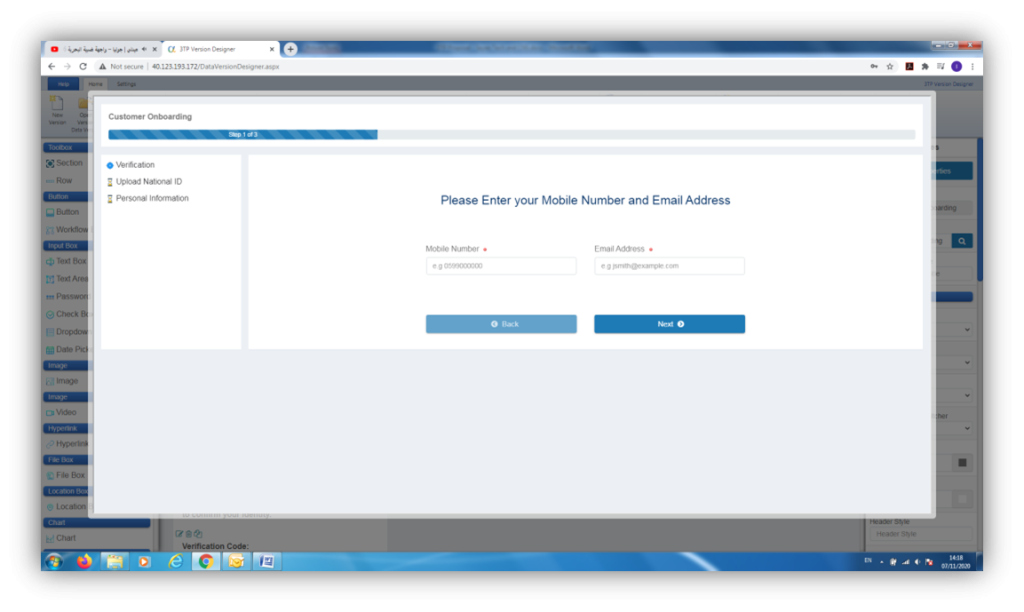
Mobile
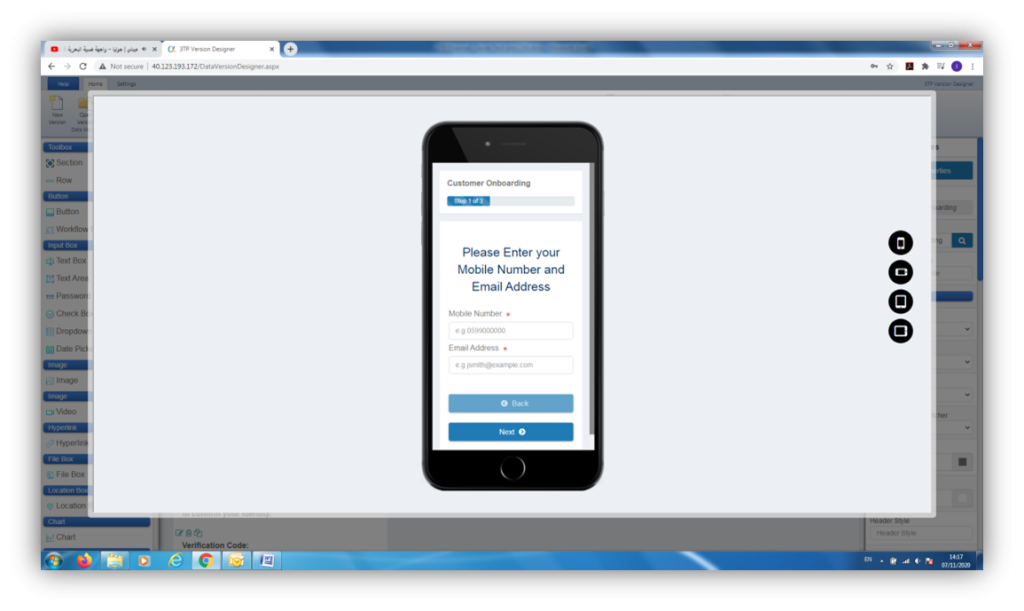
Tablet
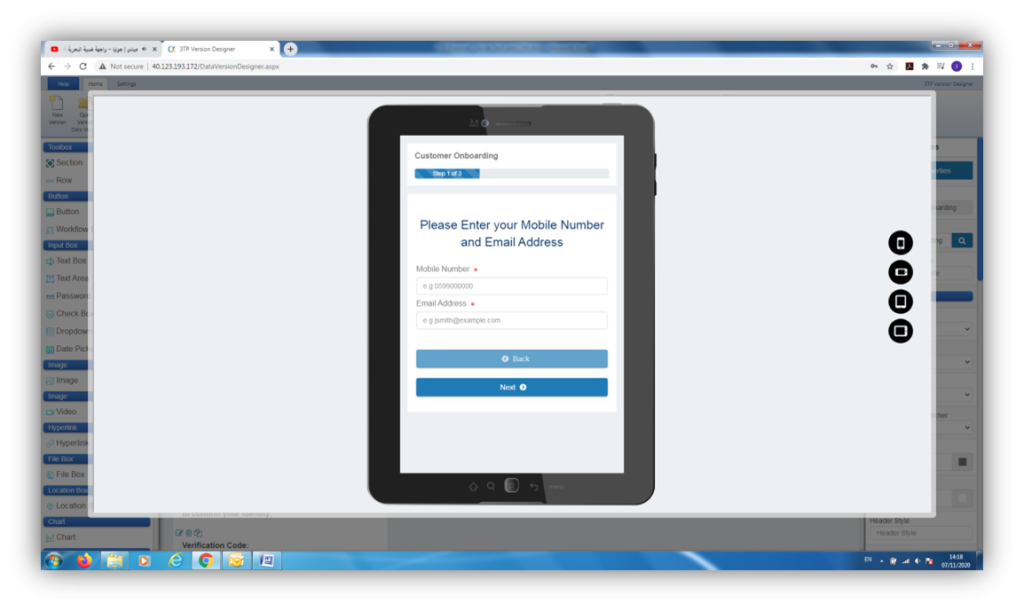
Version Designer module provides a robust and user-friendly environment for developing and customizing forms and processes according to specific business needs.
Web-based Dynamic Workflow #
BeyondKode’s Workflow Module is a web-based designer that features drag-and-drop capabilities, seamlessly integrated with all BeyondKode’s various engines. This is a non-linear type of workflow that not only manages the typical process flow from maker to checker, but also supports assigning specific authorities at a field level. For example, if an entered value exceeds a certain threshold, the flow is routed to a certain senior official for decision-making.
Key attributes of the Workflow Module include:
- Drag-and-Drop Feature: Simplifying workflow creation, users can drag a workflow node from the toolbox and drop it onto the working stage.
- Dynamic Workflow Changes: Modifications to a workflow do not affect any ongoing processes. This enables changes to workflows while users are actively using the system.
- Workflow Logging: All workflow progressions are logged in the system database for traceability and audit purposes.
- Workflow Snapshots: Before making amendments to a workflow, users can take a snapshot of the current workflow. This allows for easy rollback if necessary.
- Custom Code Execution: Users can execute custom code written in the process code directly within the workflow, providing high flexibility for process manipulation.
- API Integration: Users can connect to APIs within the workflow to send/receive data to/from third-party systems, enabling easy integration and data exchange.
- Unlimited Approval Levels and Options: The system allows for an unlimited number of approval levels and options for each process, ensuring all necessary checks and validations can be incorporated.
- Data Mapping Capabilities: The Workflow Module offers comprehensive Data Mapping functionalities. This enables users to establish seamless connections between specific design fields and the system database, fostering efficient data exchange and manipulation.
- Business Rule Integration: The Workflow Module incorporates Business Rule functionality, allowing users to define specific conditions and rules for various cases within the workflow process.
- Workflow Designer Integration: The Workflow Designer seamlessly integrates with the Version Designer; this facilitates streamlined workflow management and enhances user experience. Users can employ the Workflow Module to create decision maps to deal with specific cases. This feature enhances process clarity and aids in decision-making.
BeyondKode’s Workflow Module offers a robust, flexible, and user-friendly environment for developing and customizing workflows according to specific business needs.
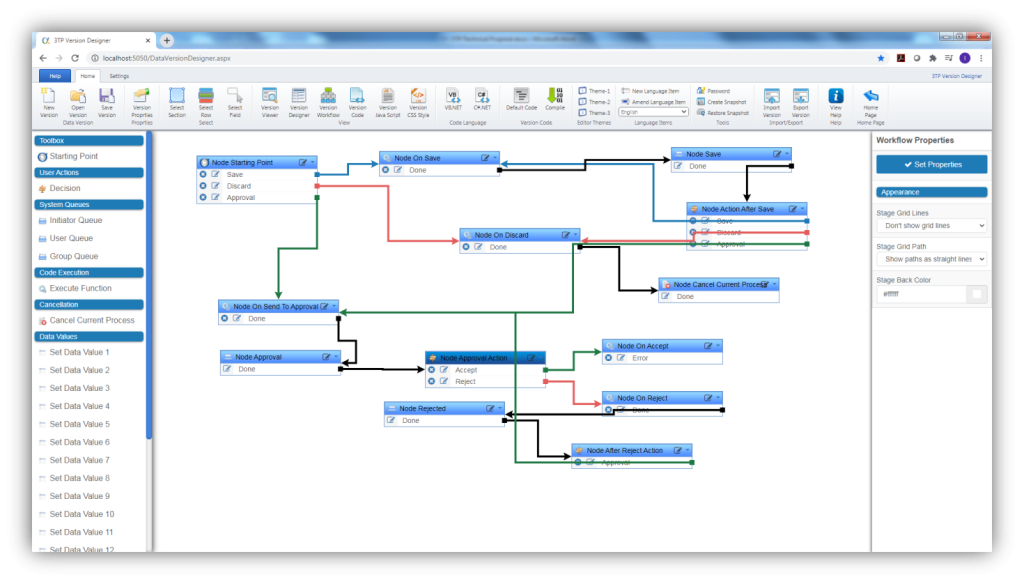
Alerts and Notifications Manager #
BeyondKode allows for an unlimited number of event configurations in multiple languages to send various types of messages in the form of alerts or notifications. These messages can be disseminated in several formats such as SMS, email, in-system screen alerts, and push notifications via the system’s mobile version.
Key functionalities include:
- Notifications Viewer: User can view all within-the-system notifications using the notification viewer where user can:
- Hide notifications.
- Mark notifications As Seen.
- Mark notifications As Unseen.

- SMS Queue: System admin can view and manage all outgoing SMS messages, with the ability to:
- Cancel sending SMS messages.
- Reschedule sending SMS messages.

- Email Queue: System admin can view and manage all outgoing email messages, with the ability to:
- Cancel sending email messages.
- Reschedule sending email messages.

Online Chat #
BeyondKode’s Online Chat Module is a seamlessly integrated communication tool designed to enhance collaboration both within an organization and externally with clients. This module operates on a system-wide scale and on a process-specific level, depending on the pre-defined rights of individual users and groups representing various organizational functions and departments.
Users engaged in executing any system processes can utilize the chat module to seek assistance or advice from their colleagues or supervisors, thus reducing the risk of process rejections due to errors. This interactivity extends to the external customers who can communicate with their designated relationship managers while submitting their requests through the organization’s online portal.
Key Features of the Online Chat Module include:
- Integrated Communication: Encourages real-time collaboration internally among team members and externally between employees and clients.
- User Rights Management: Access and interactions within the chat module are controlled by pre-defined user rights, reflecting the organization’s structure and roles.
- Pre-Validation Assistance: The chat feature facilitates peer and supervisor consultations to verify process steps and avoid rejections due to errors.
- Screen Sharing Capabilities: Users and clients can share their screens with designated stakeholders to facilitate collaborative problem-solving and discussion.
- Archiving Conversations: All interactions, including shared screen contents and chat details, are logged and archived in the process audit log, providing a record for future reviews.
Online Chat Module of BeyondKode provides a multifaceted platform for real-time collaboration, information sharing, and issue resolution, thereby increasing efficiency and enhancing user experience.
Business Intelligence Module #
BeyondKode’s Business Intelligence Module offers robust reporting capabilities directly from the system database, allowing users to generate detailed and customized reports based on specific business needs. Reports can be requested in both PDF and Excel formats, offering flexibility and compatibility with diverse data handling requirements.
Key Features of the Business Intelligence Module include:
- Report Generation: This feature provides dynamic, on-demand reports in PDF or Excel formats, directly from the system database.
- Report Designer Engine: With this tool, users can create uniquely designed reports in PDF format. The embedded report designer engine facilitates the creation of user-specific designs, enhancing the readability and usefulness of the generated reports.
- Excel Reporting: Similar to PDF reports, Excel reports can be produced in user-defined formats, with the added benefit of maintaining full Excel functionalities, including macros, directly within the system.
- Real-time Dashboards: This module enables the design of various dashboards that refresh data in real-time, providing up-to-date insights as processes are executed within the system.
BeyondKode’s Business Intelligence Module empowers users with on-demand, customizable reporting tools and real-time dashboards, providing critical insights that support data-driven decision making and operational efficiency.
Robotic Process Automation Module #
BeyondKode’s Robotic Process Automation (RPA) module is designed to emulate human tasks within a digital platform, automating processes that would typically require manual execution. Using the user interface, the RPA module can perform actions such as logging in, inquiring, and retrieving results, just as a human user would.
Here are the unique features of BeyondKode’s RPA module:
- 24/7/365 Availability: Unlike human users, the RPA module is always available, enabling continuous, round-the-clock operations. This results in significant increases in operational speed, efficiency, and effectiveness.
- Zero Error Rate: The RPA module eliminates human error, ensuring the accuracy and consistency of operations.
- Pre-built Bots: BeyondKode’s RPA module comes with a suite of pre-configured bots, designed to automate common tasks. These include:
- Extracting civil information from the Jordan Civil Affairs Portal.
- Retrieving civil status (Blacklisted or Not) from the Jordan Central Bank Portal.
- Obtaining civil salary details from the Jordan Social Security Portal.
- Gathering company information from the Jordan Ministry of Industry, Trade, and Supply.
- Extracting company information from the Jordan Companies Control Department.
The RPA module provides a robust automation solution that augments human effort, reduces errors, and significantly enhances efficiency within the digital platform. With BeyondKode, organizations can take a stride forward in their digital transformation journey.
Open Connectivity Manager #
Gone are the days when the only way to interact with an organization was through a browser-based website or desktop. The world is getting digitized and APIs are becoming the currency of commerce.
BeyondKode Platform platform can be integrated with any 3rd party system by consuming exposed APIs of that system. And also, other systems can consume BeyondKode Platform methods through exposed methods of BeyondKode Platform, where all BeyondKode Platform methods are exposed as web services.
BeyondKode Platform supports SOAP &RESTFUL (on both massage formats of JSON &XML)services and supports web socket connectivity using SignalR. To create a process on BeyondKode Platform from 3rd party system, a standard service from BeyondKode Platform side can be consumed “CreateDataProcess“, which accepts the process data as encrypted XML.
The response is an encrypted XML string. The encryption used by the system is AES-128 bit, and each integration user has a specific encryption key used to encrypt request XML, and decrypt response XML.
Hardware Integrations Agent #
The Hardware Management Integrations Agent offers a seamless method of interfacing BeyondKode platform with your hardware. This desktop application, developed using Visual Studio 2017, integrates directly with your hardware’s SDKs, enabling BeyondKode to interact with and control various hardware components.
Installed directly on the user’s PC, the Hardware Management Integrations Agent provides a local point of contact between the BeyondKode platform and the hardware in use. This efficient solution ensures that you can fully harness the capabilities of your hardware while utilizing BeyondKode, thereby maximizing productivity and effectiveness.
This module opens up a range of possibilities, from basic operations such as reading data from hardware devices to more complex tasks like controlling hardware functions. No matter the task, the Hardware Management Integrations Agent makes it possible, turning BeyondKode into a comprehensive, hardware-compatible platform.
User Security Protocols #
BeyondKode offers a flexible and secure approach to user account management, catering to a variety of needs. The platform can manage both local and Active Directory accounts, each with its own unique benefits:
- Local Accounts: These are user accounts that exist within the BeyondKode system. They are created and managed directly by BeyondKode. The account status and password policy for these accounts are controlled within BeyondKode itself. Additionally, permissions within BeyondKode, such as access to certain forms or functions, are managed by a system administrator using dedicated forms.
- Active Directory Accounts: These are user accounts that exist within an organization’s Active Directory. The account status and password policy for these accounts are managed by the Active Directory. However, permissions within BeyondKode are still managed by a system administrator using special forms.
The permissions in BeyondKode can be assigned at various levels including:
- Process type permissions: These control which users can access or perform certain types of processes within the system.
- Form type permissions: These determine which users have access to specific types of forms in the system.
- Function type permissions: These control which users can perform specific functions within the system.
By offering both types of account management, BeyondKode provides organizations with the flexibility to use either locally managed accounts or utilize their existing Active Directory infrastructure, making it a versatile solution for a range of different organizations.
Single Sign-On #
BeyondKode offers a Single Sign-On (SSO) solution, simplifying user authentication and access management across multiple applications. With SSO, users can log in once using their credentials and gain access to multiple connected systems without the need to re-enter their login information for each application.
Key features and benefits of BeyondKode’s SSO solution include:
- Centralized User Authentication: Users only need to authenticate once to access multiple applications connected to the BeyondKode platform. This eliminates the hassle of remembering and managing multiple usernames and passwords.
- Enhanced User Experience: SSO streamlines the login process, making it more efficient and user-friendly. Users can seamlessly navigate between different applications without the need for repeated authentication.
- Improved Security: BeyondKode’s SSO solution ensures that authentication and authorization processes are handled securely. User credentials are managed centrally, reducing the risk of weak passwords or unauthorized access.
- Time and Cost Savings: SSO significantly reduces the time and effort required for users to log in to multiple applications, leading to increased productivity and cost savings. It also simplifies user account management and reduces help desk support related to password resets.
- Integration Flexibility: BeyondKode’s SSO solution can integrate with various identity providers and protocols, allowing seamless integration with existing authentication systems and ensuring compatibility with different application environments.
By offering a robust SSO solution, BeyondKode streamlines access to connected applications, enhances security, and improves overall user experience, contributing to increased productivity and efficiency within the organization.
Documents Archiving Technique #
BeyondKode is equipped with advanced document archiving capabilities, catering to various needs and preferences:
- Archiving documents in BeyondKode database: This approach is convenient and straightforward. The documents are stored directly within the BeyondKode’s database, making it easy to access and manage them within the system.
- Archiving documents in a special database under BeyondKode: For organizations that prefer to separate their document storage from the main application database, BeyondKode can store documents in a separate, dedicated database. This can provide added flexibility and can improve performance by reducing load on the main database.
- Archiving documents in a 3rd party document management system through APIs: For organizations that already use a third-party document management system,
BeyondKode can integrate with these systems via APIs. This allows you to leverage your existing document storage infrastructure, ensuring that documents are consistently managed across all your systems.
Separation of Duties #
BeyondKode also supports the concept of Separation of Duties (SoD). This is a key concept in internal controls that ensures no single individual has control over all phases of a business transaction or operation. It reduces the risk of fraud and error.
In BeyondKode, workflows for a given process can be designed with one or more levels of authorization, with either a single authorizer or multiple combined authorizers. This allows the workflow designer to specify the flow of the process and assign responsibilities to different individuals or roles, effectively implementing SoD within the system’s processes. This makes BeyondKode not only a powerful tool for process management but also a tool that encourages and supports best practices in internal controls.
High Availability (HA) #
High Availability (HA) is a crucial feature for modern software platforms, and BeyondKode recognizes this importance. BeyondKode supports a High Availability (HA) production server configuration, ensuring that the system remains operational and accessible even if some components fail.
High Availability systems are designed to be operational continuously for a desirably long length of time. They are typically set up as redundant servers in active-active or active-passive configurations. In an active-active setup, traffic is balanced across multiple servers. If one server fails, the others can take over the load. In an active-passive setup, a standby server kicks in when the primary server fails.
By supporting HA Production Server configurations, BeyondKode aims to minimize downtime and prevent disruption to users. This commitment to continuous operation is critical for businesses that rely on BeyondKode for important processes and services, ensuring that system failures won’t impede their activities. This feature underscores BeyondKode’s reliability and its suitability for businesses that require an always-on, resilient software platform.
Add On’s #
BeyondKode Solutions takes pride in its ability to continuously innovate and adapt to evolving technologies and industry demands. They have prioritized seamless integrations with numerous third-party software and hardware, particularly those prevalent within the banking industry. This allows BeyondKode to deliver a platform that enhances operational efficiency, reduces implementation time, and increases overall productivity for its clients.
As of now, BeyondKode integrates with the following third-party software and hardware:
- Morpho Chip Card and Fingerprint Readers: Ensures secure user authentication through advanced biometric technologies.
- Wacom Digital Signature Pads: Facilitates electronic document signing, enhancing convenience while ensuring security.
- MagTec PIN Pad for Debit and Credit Cards: Provides secure, efficient card payment processing solutions.
- Regula Document Scanner and OCR SDK: Enables fast, accurate scanning of passports, National IDs, travel visas, and other important documents.
- Salesforce CRM: Connects with this leading customer relationship management platform to enhance customer interactions and data management.
- Temenos Core Banking System: Integrates with one of the world’s leading banking software systems, providing robust financial functionality.
- Siron Embargo of FICO: Links with FICO’s renowned financial crime risk management platform to ensure regulatory compliance and mitigate risks.
- Jordan Civil Affairs Portal (Robotics): Uses Robotic Process Automation (RPA) for seamless extraction of civil information.
- Jordan Central Bank Portal (Robotics): Enables RPA-assisted information retrieval, particularly regarding civil status.
- Jordan Social Security Portal (Robotics): Leverages RPA for swift extraction of civil salary data.
- Jordan Ministry of Industry, Trade and Supply (Robotics): Facilitates RPA- driven extraction of company information.
- Jordan Companies Control Department (Robotics): Utilizes RPA to pull company data efficiently.
The continuous expansion of BeyondKode’s integration capabilities demonstrates the company’s commitment to remaining at the forefront of technological innovation and meeting the specific needs of different industries.
In conclusion, BeyondKode offers a comprehensive and dynamic platform that empowers organizations to streamline their digital operations and drive innovation. With its wide range of modules and features, BeyondKode enables efficient process automation, seamless integration with third-party systems, and enhanced collaboration among users.
The platform’s key modules, such as Version Designer, Workflow Designer, and Online Chat Module, provide intuitive and flexible tools for designing and managing processes, workflows, and real-time communication. BeyondKode’s Business Intelligence module delivers robust reporting and dashboard capabilities, empowering data-driven decision-making.
BeyondKode’s integrations with third-party software and hardware, coupled with its support for Single Sign-On, ensure seamless connectivity and enhanced user experience. Additionally, the platform’s ability to archive documents and enforce separation of duties adds an extra layer of security and compliance.
The reliability and availability of BeyondKode are further demonstrated through its support for high availability production servers, ensuring continuous operations and minimal downtime.
Overall, BeyondKode offers a powerful and adaptable solution that accelerates digital transformation, promotes collaboration, and enhances operational efficiency. With BeyondKode, organizations can unlock new levels of productivity, drive innovation, and stay ahead in today’s rapidly evolving digital landscape.
